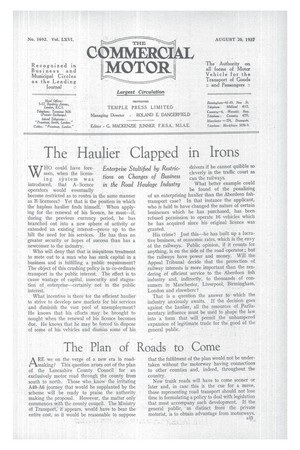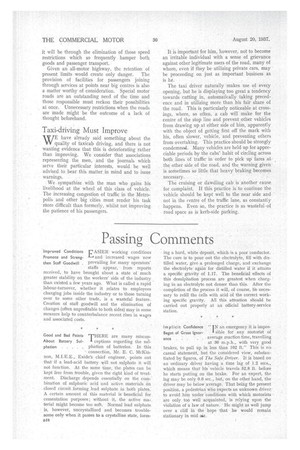The Plan of Roads to Come
Page 25

Page 26

If you've noticed an error in this article please click here to report it so we can fix it.
ARE we on the verge of a new era in roadmaking? This question arises out of the plan of the Lancashire County Council for an exclusively motor road through the county from south to north. Those who .know the irritating A49-A6 journey that would he supplanted by the scheme will be ready to praise the authority making the proposal. However, the matter only commences with the county council. The Ministry of Transport, it appears, would have to bear the entire cost, so it would be reasonable to suppose that the fulfilment of the plan would not be undertaken without the motorway having connections to other counties and, indeed, throughout the country. New trunk roads will have to come sooner or later and, in case this is the cue for a move, those representing road transport should not lose time in formulating a policy to deal with legislation that must accompany such development. If the general public, as distinct froM the private motorist, is to obtain advantage from motorways, it will be through the elimination of those speed restrictions which so frequently hamper both goods and passenger transport.
Given an all-motor highway, the retention of present limits would create only danger. The provision of facilities for passengers joining through services at points near big centres is also a matter worthy of consideration. Special motor roads are an outstanding need of the time and those responsible must reckon their possibilities at once. Unnecessary restrictions when the roads are Made might be the outcome of a lack of thought beforehand.
Taxi-driving Must Improve
WE have already said something about the quality of taxicab driving, and there is not wanting evidence that this is deteriorating rather than improving. We consider that associations representing the men, and the journals which serve their particular interests, would be well advised to bear this matter in mind and to issue warnings, We sympathize with the man who gains his livelihood at the wheel of this class of vehicle. The increasing congestion of traffic in the Metropolis and other big cities must render his task More difficult than formerly, whilst not improving the patience of his passengers. It is important for him, however, not to become an irritable individual with a sense of grievance against other legitimate users of the road, many of whom, even if they be utilizing private cars, may be proceeding on just as important business as is he.
The taxi driver naturally makes use of every opening, but he is displaying too great a tendency towards cutting in, automatically taking precedence and in utilizing more than his fair share of the road. This is particularly noticeable at crossings, where, so often, a cab will make for the centre of the stop line and prevent other vehicles from drawing up at either side of him, apparently with the object of getting first off the mark with his, often slower, vehicle, and preventing others from overtaking. This practice should be strongly condemn. Many vehicles are held up for appreciable periods by the cabs' habit of circling across both lines of traffic in order to pick up fares at the other side of the road, and the warning given is sometimes so little that heavy braking becomes necessary.
The cruising or dawdling cab is another cause for complaint. If this practice is to continue the vehicle should be kept well to the near side and not in the centre of the traffic lane, as constantly happens. Even so, the practice is as wasteful.of road space as is kerb-side parking.




















































































